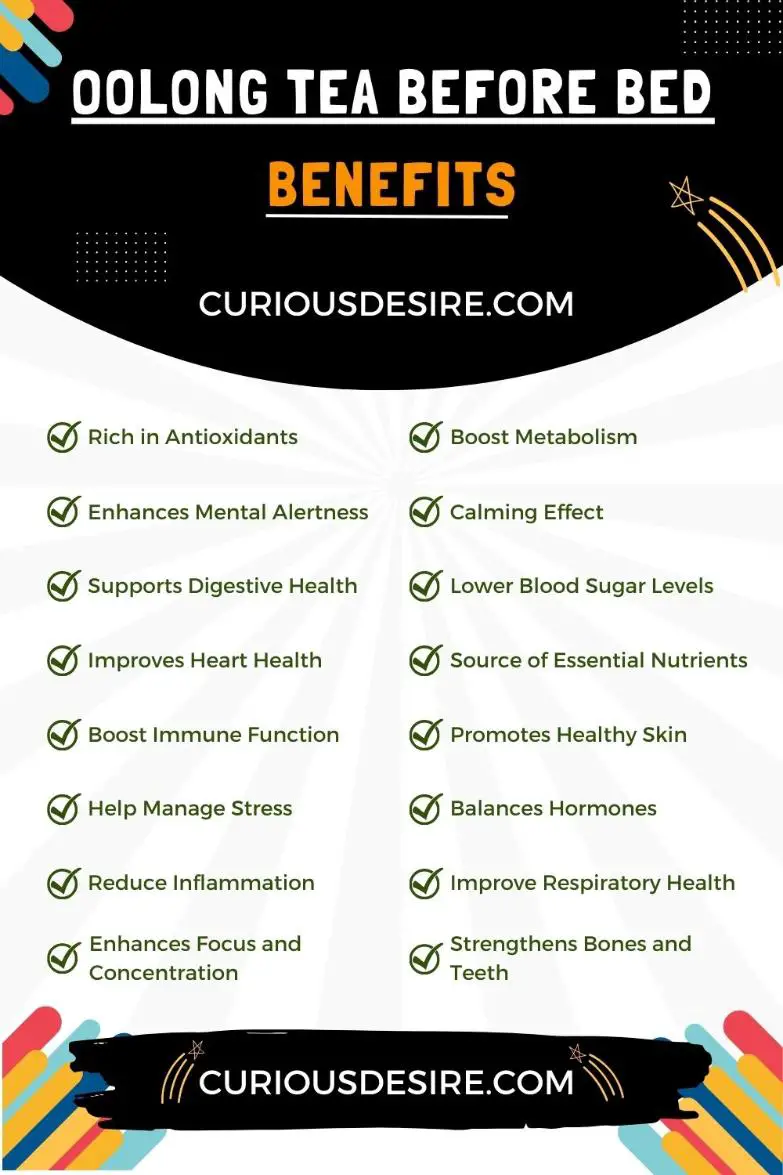Ever thought about a special drink that tastes great and makes bedtime super nice?
Well, here’s oolong tea – originating from ancient Chinese traditions and gradually captivating tea enthusiasts worldwide. It’s not just a drink before bed; it’s like having a comforting friend with lots of good things that make your nights comfy and fun.
Come with us as we explore the cool world of oolong tea. Discover how each sip makes you feel like a superhero, wrapping you in a warm embrace for a peaceful night’s sleep and delightful dreams.
Top 5 benefits of oolong tea before bed:
- Boosts Metabolism
- Supports Digestive Health
- Promotes Healthy Skin
- Improve Respiratory Health
- Improve Brain Function
Benefit 1: Rich in Antioxidants
The antioxidants present in black tea like theaflavin are present in oolong tea along with those present in green tea like catechin.
This study published in Antioxidants suggests that oolong tea has a higher number of antioxidants as compared with many other teas.
By reducing oxidative damage, oolong tea contributes significantly to overall cellular health. This not only helps in mitigating the impacts of aging but also holds promising potential in reducing the risk of several chronic diseases.
Benefit 2: Boost Metabolism
Oolong tea offers a dual advantage in promoting weight management.
Firstly, its metabolism-boosting effects, driven by the collaboration of caffeine and epigallocatechin gallate (EGCG), set calorie-burning mechanisms in motion. This natural energy lift, devoid of typical side effects, establishes oolong tea as a valuable ally in weight control, especially when complemented by a balanced lifestyle.
Additionally, oolong tea contributes to weight management by aiding in fat oxidation as suggested by this research done on 12 men. The combined action of caffeine and polyphenols facilitates the breakdown of stored fat for energy, providing a multifaceted approach to effective weight loss and the maintenance of a healthy weight.

Benefit 3: Enhances Mental Alertness
The caffeine content in oolong tea acts as a gentle stimulant, fostering heightened mental alertness and concentration.
This effect becomes especially valuable before bedtime, as it provides a state of wakeful clarity without the restlessness often associated with higher doses of caffeine.
According to a 2014 review, the combination of caffeine and theanine in tea led to heightened alertness and improved attention within the initial 1 to 2 hours post-consumption
Oolong tea becomes a thoughtful choice for those seeking a mental boost that complements the transition into a restful night’s sleep, offering a bridge between wakefulness and slumber.
Benefit 4: Calming Effect
Contrary to common expectations tied to caffeine consumption, oolong tea manages to induce a calming effect, thanks to the presence of the amino acid L-theanine. This unique combination offers relaxation without inducing drowsiness.
Benefit 5: Supports Digestive Health
Oolong tea’s impact on digestive health is marked by its ability to promote the production of digestive enzymes. These enzymes play a pivotal role in breaking down food, easing bloating, and facilitating smooth digestion.
A paper published in 2019 suggests that consuming oolong tea could positively influence the composition of the gut microbiome, resulting in good digestive health
By fostering optimal digestion, oolong tea becomes a supportive element in ensuring a more comfortable night’s sleep, minimizing disruptions often associated with digestive discomfort.
Benefit 6: Help Lower Blood Sugar Levels
Research done on 20 people in Taiwan while they were subjected to oolong tea for 30 days shows that using Oolong tea could be a beneficial addition to the treatment of type 2 diabetes.
This potential benefit becomes particularly relevant before bedtime, as stabilizing blood glucose overnight could contribute to overall metabolic health.
Benefit 7: Improves Heart Health
The positive impact of oolong tea on heart health is multifaceted, primarily revolving around the reduction of cholesterol levels.
Journal of Epidemiology and Public Health published a study that involved around 80,000 individuals who had a habit of drinking tea and concluded that the consumption of tea reduced the mortality rate due to different cardiovascular diseases.
Additionally, the risk of stroke was reduced to 21% in individuals drinking 3 cups of tea per day.
Regular consumption becomes a proactive step toward maintaining a healthy heart and circulatory system, contributing to overall cardiovascular resilience.
Benefit 8: Strengthens Bones and Teeth
Enriched with essential minerals like calcium and magnesium, oolong tea becomes a supporter of skeletal health.
These compounds have all been supposed to have detrimental or beneficial effects on bone mineral density (BMD) and risk for fracture, as supported by this study.
Moreover, dental health has also been associated with getting better with the drinking of tea. Drinking tea is linked to improved dental health, leading to reduced plaque and gingivitis, resulting in overall healthier teeth. ( Tea and Oral Health )
The mineral richness of oolong tea becomes an aspect of its overall nutritional profile, offering subtle yet meaningful support to the body’s structural integrity.

Benefit 9: Boost Immune Function
Oolong tea’s rich flavonoids are beneficial for the immune system, playing a role in preventing cellular damage and boosting the production of antibacterial proteins.
During cold and flu season, oolong tea not only provides a defense against infections but also contributes to combating free radicals, which have associations with conditions ranging from cancer and strokes to arthritis.
Benefit 10: Promotes Healthy Skin
The compounds present in the oolong tea may play a role in combatting skin conditions such as eczema, which has been shown in the study which was done on around 100 participants.
Benefit 11: Help Manage Stress
The presence of theanine, an amino acid, is believed to have calming and relaxing effects on the mind without inducing drowsiness. Theanine is known to promote the production of alpha brain waves, associated with a state of relaxation and mental alertness.
Additionally, oolong tea contains moderate levels of caffeine, which can contribute to increased alertness and improved mood.
Frontiers in Nutrition published that oolong tea has the potential to reduce heart rate variability, which is an indicator of short-term stress, particularly among college students.
Benefit 12: Balances Hormones
Benefit 13: Reduce Inflammation
Not only does oolong tea fight inflammation directly, but it also stimulates your body’s anti-inflammatory warriors. It promotes the production of enzymes like superoxide dismutase (SOD), which neutralize harmful free radicals, further fighting the inflammation.
Oolong tea’s anti-inflammatory power extends beyond general benefits. It may specifically target tissues often plagued by inflammation.
Maintaining a balanced lifestyle and consulting with a healthcare professional can provide personalized guidance for managing inflammation effectively.

Benefit 14: Improve Respiratory Health
Oolong tea’s antioxidant properties extend to potential benefits for respiratory health.
The study by the European Journal of Nutrition showed that a daily cup of tea intake is causally linked to a reduced risk of bronchiectasis, pneumonia, and influenza
The respiratory benefits of oolong tea add a layer of significance to its potential impact on overall health, showcasing its versatility beyond traditional expectations.
Benefit 15: Source of Essential Nutrients
Beyond its antioxidant content, oolong tea serves as a source of essential nutrients that are essential for the normal functioning of the human body such as:
- Polyphenols, Caffeine ( Food Science and Human Wellness )
- Theanine
- Vitamins (A, B, C, E, K)
- Minerals ( Critical Reviews in Food Science and Nutrition )
Benefit 16: Lower the Risk of Certain Cancers-
The Chinese research which went on for more than 10 years compared tea drinkers with non-tea drinkers and concluded that the tea drinkers had a lesser rate of all types of cancer than their counterparts.
The presence of a variety of antioxidants, particularly catechins, demonstrates the potential to reduce the risk of specific cancers.
The regular inclusion of oolong tea in your routine becomes a proactive step toward supporting the body’s defenses against the development of cancer cells.
Benefit 17: Improve Brain Function-
The caffeine content in oolong tea, complemented by L-theanine stimulates improved cognitive function, potentially enhancing memory and overall brain health.
Additionally, Dopamine and norepinephrine are stimulated with the intake of caffeine, which affects positively brain health and mood as published in 2020.
Oolong tea, with its polyphenols preventing plaque proteins from attacking brain cells, could be the beverage to help keep your mind sharp and focused.
Oolong Tea Before Bed Benefits FAQs
1. How does oolong tea contribute to weight management before bedtime?
Oolong tea emerges as a weight management ally through its ability to boost metabolism. The dynamic duo of caffeine and epigallocatechin gallate (EGCG) stimulates the body’s calorie-burning mechanisms.
By increasing metabolic rate, oolong tea facilitates more efficient energy expenditure. This metabolic boost, occurring even before bedtime, positions oolong tea as a valuable companion in the journey toward weight management.
2. Can oolong tea be consumed before bed without affecting sleep?
Absolutely. Despite oolong tea containing caffeine, its unique composition ensures a calming effect, thanks to the presence of L-theanine. This amino acid works in harmony with caffeine, inducing relaxation without inducing drowsiness.
When consumed before bedtime, oolong tea becomes a soothing prelude to sleep.
3. What sets oolong tea apart in terms of antioxidant content?
Oolong tea stands out for its rich array of antioxidants, comprising polyphenols and catechins. These powerful compounds actively combat free radicals, unstable molecules that can cause cellular damage. By neutralizing these free radicals, oolong tea contributes to overall cellular health.
The distinctive blend of antioxidants in oolong tea adds a layer of significance to its role in promoting well-being.
4. How does oolong tea contribute to heart health?
Oolong tea’s positive impact on heart health is multifaceted. One key aspect is its potential to lower cholesterol levels. Regular consumption of oolong tea has been associated with a reduction in LDL cholesterol, the “bad” cholesterol.
By supporting cardiovascular well-being, it becomes a proactive choice for maintaining a healthy heart and circulatory system.
5. Can oolong tea be beneficial for individuals with respiratory conditions?
Yes, oolong tea’s antioxidant properties extend to potential benefits for respiratory health. Regular consumption may contribute to improved breathing and lung function, offering support for individuals with respiratory conditions.
Consult with healthcare professionals for personalized advice, the respiratory benefits of oolong tea showcase its versatility beyond traditional expectations, making it a potential addition to holistic respiratory care.
6. What role does oolong tea play in hormonal balance?
Oolong tea’s compounds, including polyphenols, may contribute to hormonal balance. This delicate equilibrium influences various bodily functions, from mood regulation to reproductive health.
While the effects are subtle, the potential impact on hormonal harmony positions oolong tea as a beverage that extends beyond mere refreshment.
7. How does oolong tea address inflammation in the body?
Oolong tea’s polyphenols, known for their antioxidant properties, play a crucial role in mitigating inflammation in the body. Chronic inflammation is associated with various health issues, and the regular consumption of oolong tea becomes a proactive step toward prevention.
By combating inflammation, oolong tea contributes to the overall well-being of the body, showcasing its potential impact on conditions related to chronic inflammation.
8. Are there specific nutrients in oolong tea that contribute to bone health?
Absolutely. Oolong tea is a rich source of essential minerals like calcium and magnesium, both crucial for bone health. These minerals contribute to the fortification of bones and teeth, complementing the benefits of a diet rich in other calcium sources.
It maintains a balanced diet, and incorporating oolong tea into your routine becomes a subtle yet meaningful way to support the body’s structural integrity, especially concerning bone health.
9. What are the overall benefits of oolong tea before bed?
The benefits of oolong tea before bed are diverse, contributing to a holistic approach to well-being. From its role in weight management and enhancing mental alertness to supporting digestive health, immune function, and heart health, oolong tea has become a multifaceted elixir.
Its ability to induce relaxation without disrupting sleep, address inflammation, and potentially influence hormonal balance adds layers to its benefits.
